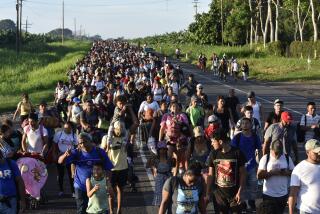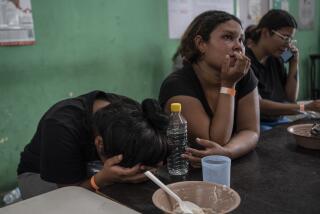72 Cubans Refusing to Leave Mexican Embassy : Immigration: The group in the Dominican Republic seeks U.S. asylum. Mexico says it can’t help.
MEXICO CITY — Seventy-two Cuban asylum-seekers remained steadfastly planted Friday on the grounds of the Mexican Embassy in the Dominican Republic, presenting authorities here with the latest in an escalating series of immigration crises.
U.S. policy-makers have also watched the unfolding drama with some concern, anxious not to encourage a new Cuban exodus toward the United States, with Mexico serving as a transit point.
“We do not want to entertain Mexico as a springboard for Cubans seeking to enter the United States,” said one U.S. official monitoring the situation.
The Cubans, among them 24 children and at least three pregnant women, burst into the embassy garden in Santo Domingo on Thursday morning--Mexican Independence Day--and sought assistance in their quest to enter the United States. The Mexican Foreign Relations Secretariat issued a terse declaration that Mexico is unable to grant U.S. visas or otherwise officially facilitate their entry into a third country.
The group then refused to leave the embassy grounds, triggering a standoff that continued late Friday. The 72 Cubans are believed to be part of a larger group of some 200 U.S.-bound Cubans who have been stranded in the Dominican Republic for weeks.
The so-called embassy “invasion,” as it is known here, is the third heavily publicized incident in recent weeks in which Cubans fleeing their battered island have sought to use Mexican territory or missions as intermediate steps en route to Florida.
Last week, 11 Cubans who occupied the Mexican Embassy in Havana were flown to Mexico City, where they have signaled their intentions to petition Washington for entry papers. That case came in the aftermath of the sensational plight of eight Cuban shipwreck victims who were initially sent back to Cuba from Mexico, returned here after a public outcry, and finally allowed to enter the United States.
The actions have sorely tested the Mexican government, which maintains warm relations with the regime of Fidel Castro.
Some here have accused anti-Castro groups of provoking the incidents as a means of rupturing relations between Mexico City and Havana. But Mexican authorities have taken pains not to offend the politically influential Cuban-American exile lobby in Florida, which generally views those fleeing Cuba as political refugees deserving of asylum.
In all of the recent cases, however, Mexico has refused to grant political asylum to the fleeing Cubans. Such a step would undoubtedly be perceived as an affront to Castro, who is still an icon for much of the Latin American left, including Mexico’s.
Instead, Mexico has found a compromise, providing the two previous groups of asylum-seekers with visitor visas. Mexican authorities declined to say whether they contemplate the same solution regarding the much larger group of Cubans at the embassy in Santo Domingo.
“Mexico is a defender of the right of asylum,” the Mexican Foreign Relations Secretariat declared in its statement, “but it will not accept the role of instrument of provocation against nations with which it has normal diplomatic relations.”
In addition, Mexican officials have adamantly declared that their nation cannot serve as a “trampoline” for U.S.-bound emigrants from Cuba, the western tip of which is less than 150 miles from Mexico’s Yucatan Peninsula.
In Havana, where asylum-seekers have petitioned the embassies of several Latin American nations in recent days, Cuban President Castro blamed Washington for the surge.
“It’s been a policy of the United States, as part of its campaign of hostility against Cuba, to encourage illegal attempts to leave the country . . . to extract a political advantage from the spectacle of people running away in rafts or boats,” Castro told reporters, according to the Reuters news agency.
U.S. officials, Castro said, were not allowing sufficient numbers of Cubans to travel to the United States and thereby were encouraging illicit exits.
Despite Castro’s incendiary tone, U.S. officials said they are confident the Cuban leader is not on the verge of permitting another large-scale departure such as the so-called Mariel boatlift of 1980.
Some 125,000 Cubans entered the United States during the massive evacuation, which began after would-be refugees besieged the Peruvian Embassy in Havana.
U.S. authorities are anxious to prevent a repeat of the historic flight.
U.S. authorities discourage Cubans from leaving the island illicitly in dangerous boat trips bound for Florida, said one State Department official, and encourage those seeking to leave the island to apply formally for permission to enter the United States.
More to Read
Sign up for Essential California
The most important California stories and recommendations in your inbox every morning.
You may occasionally receive promotional content from the Los Angeles Times.










